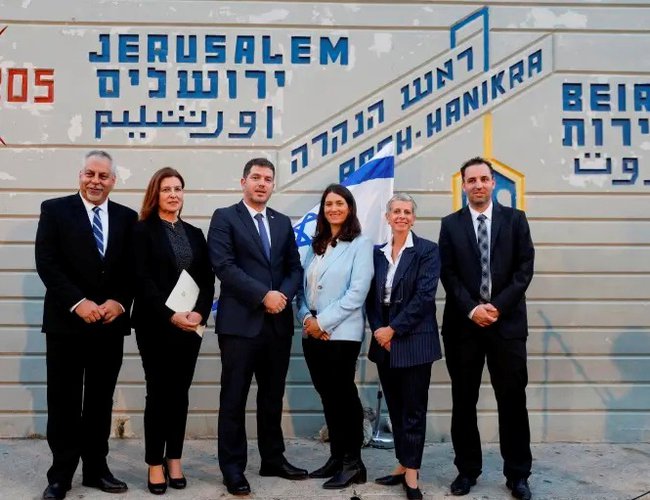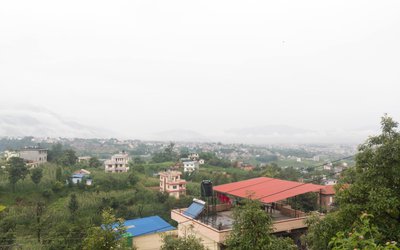
The Israeli and Lebanese negotiating teams put the final signatures on their countries’ maritime boundary agreement on Thursday.
The delegations met around a table at the UN Interim Force in Lebanon (UNIFIL) headquarters in Naquora, on the border between the countries.
“We have a maritime border. Congratulations,” Hochstein said at the end of the ceremony, to applause.
US President Joe Biden tweeted about the deal, saying it “promotes the interests of both countries and the region, and this moment marks a new chapter of prosperity and hope. Congratulations to all involved.”
Earlier, Prime Minister Yair Lapid signed the deal in Jerusalem and Lebanese President Michel Aoun signed it in Beirut. Hochstein met with each leader in their respective capitals.
Hochstein said in Jerusalem that the agreement “enhances Israeli security and prosperity and enhances the economy on both sides…[This is] day one of more cooperation, more Israeli integration into the region, a top priority of President Biden. We in the US are clearly very happy that we can play a role and support Israel’s security, economy and prosperity.”
The US envoy said in Beirut that he expects the agreement to hold even amid changes in leadership in both countries. Referring to both the upcoming election in Israel on November 1 and the end of Aoun’s term on October 31, Hochstein said the agreement should be kept up “regardless of who is elected very soon as next president of Lebanon.”
Knesset review
The cabinet voted in favor of the deal on Thursday morning, two weeks after the government submitted the deal to the Knesset for review, but not a vote, a procedure confirmed by the High Court of Justice.
Lebanon's Prime Minister-designate Najib Mikati meets with US Senior Advisor for Energy Security Amos Hochstein and US Ambassador to Lebanon Dorothy Shea in Beirut, Lebanon
The agreement “strengthens and fortifies Israel’s security and our freedom to act against Hezbollah and threats from the north,” Lapid said at the cabinet meeting.
Beirut’s chief negotiator Elias Bou Saab said the agreement marked the beginning of a “new era.”
The countries did not negotiate directly and signed separate documents. Lebanon does not recognize Israel in the framework of the deal and has said repeatedly that it does not consider the agreement to be a form of normalization. Boy Saab reassured the Lebanese public in a press conference that “there is nothing hidden.”
Despite this, Lapid considered the agreement to be a form of recognition.
“This is a diplomatic achievement,” he said. “It’s not every day that an enemy state recognizes the State of Israel in a written agreement before the whole international community.”
The agreement will allow Lebanon, through its licensee, French energy company TotalEnergies, to develop the Kana Reservoir and extract natural gas that may be there. The gas field was in an area of the Mediterranean Sea that Israel and Lebanon claimed as their own; Israel conceded the entire disputed zone but will receive 17% of the value of Kana once Total has done a thorough survey of how much gas is in the reservoir, which is expected to take over a year.
Lapid called this “an economic achievement that will bring money into the country that will be used for welfare, health, education and security.”
Qatar asked Lebanon to take part in Kana’s development, Kan reported. Israel has veto power over the companies working in the reservoir, according to the agreement.
The deal also gives a more official international standing to the “buoys line,” a physical boundary that the Israeli Navy set up in 2000, which extends 5 km. into the sea from the Israel-Lebanon land border.
Energean began extracting natural gas from the Karish field, the British company with the license for developing the reservoir confirmed on Wednesday. Gas sales to Energean’s customers are expected to begin in the coming days, according to the company.
Lapid said in his joint statement with Hochstein that, with the production of gas from Karish, Israel “will become a major supplier of gas to Europe at a time in which the world is in desperate need.”
Hezbollah stands down after deal signed
Hezbollah, the Iran-backed terrorist group that is a party in Lebanon’s government, threatened Karish in recent months, claimed it is in the dispute and launched drones at it – which Israel shot down – though it is not in the area that was under negotiation with Israel.
Defense Minister Benny Gantz praised the deal at the end of his visit to Turkey.
“I want to say clearly: This agreement harms Hezbollah’s interests and it has the potential to prevent an escalation in the future by raising the cost to Lebanon,” Gantz said.
During their joint statement, Kan caught Lapid whispering to Hochstein in Hebrew that after the Israel-Lebanon deal, “maybe you’ll be forgiven for destroying relations with the Saudis.”
“Oh God,” Hochstein, who grew up in Israel, said in English, and then the two of them laughed.
Source: Jerusalem Post
- Japan, China Foreign Ministers Meet In Laos
- Jul 27, 2024
- Obamas Back Harris As Democratic Presidential Nominee
- Jul 27, 2024
- Paris Olympic Games Officially Open With Ceremony Along River Seine
- Jul 27, 2024
- Biden And Netanyahu Discuss Gaza Ceasefire
- Jul 26, 2024
- Paris Olympic Will Start On Saturday
- Jul 25, 2024
















